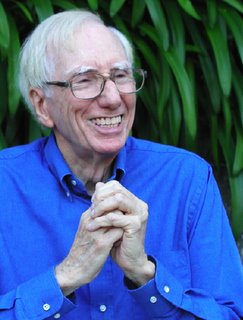 Preeminent sociologist of religion and Tricycle contributor Robert N. Bellah has passed away after complications following a minor surgery. He was 86.
Preeminent sociologist of religion and Tricycle contributor Robert N. Bellah has passed away after complications following a minor surgery. He was 86.
Bellah had most recently served as the Elliott Professor of Sociology, Emeritus, at the University of California at Berkeley. Through his teaching and writing throughout his post there, his ideas spread far beyond the academy to greatly impact our understanding of religion and spirituality in the culture at large. In 2000, he received the National Humanities Medal from President Bill Clinton in recognition of his accomplishments.
Robert was not only a contributor to Tricycle (“The R Word“) but also a friend, mentor, and inspiration to the editors. His ideas about Buddhism, spirituality, and religion continue to inform the magazine’s mission.
When it came to Buddhism, Bellah went beyond the familiar imperative to adapt the tradition to the current milieu. Instead he addressed issues of cultural transmission that took into account the historical contexts from which these traditions arose. Neglecting to examine these historical contexts, Bellah argued, “would be to risk tailoring them to cultural assumptions that might be anything but emancipatory.”
Bellah saw these forces at work in American Buddhism, where the individualistic side of the religion became emphasized “only to contribute to our pathology, not ameliorate it.” Such approaches to Buddhism and various forms of religious mysticism overlapped with “spirituality,” the contemporary usage of which Bellah was wary:
The way ‘spirituality’ is often used suggests that we exist solely as a collection of individuals, not as members of a religious community, and that religious life is merely a private journey. It is the religious expression of the ideology of free-market economics and of the radical ‘disencumbered’ individualism that idolizes the choice-making individual as the prime reality in the world.
Bellah also wrote critiques of the hegemony of reason within our culture, exposing how it came to eclipse other forms of truth and knowing. In Bellah’s history of human development, “we are first embodied knowers, then stroytellers, and only then analytic thinkers,” as contributing editor Linda Heuman explains in her review of Religion in Human Evolution, Bellah’s magnum opus. “Reason comes not first but last—it is the newest member of an established team, not the captain but a co-player.”
“Once disengaged theory becomes possible…it can abandon any moral stance at all and look simply at what will be useful, what can make the powerful and exploitative even more so,” writes Bellah. “Inquiry for the sake of understanding, with or without moral evaluation…has given humans the power to destroy their environment and themselves.”
In an age when religious fundamentalism and so-called militant atheism flourish side by side, Bellah’s voice remains as important as ever, and will be greatly missed.
Selected Works from Tricycle
“The Future of Religion” – Features Editor Andrew Cooper interviews Robert Bellah
“The R Word” – An original essay by Robert Bellah
“Religion in Evolution” – Contributing Editor Linda Heuman reviews Bellah’s magnum opus
Thank you for subscribing to Tricycle! As a nonprofit, we depend on readers like you to keep Buddhist teachings and practices widely available.